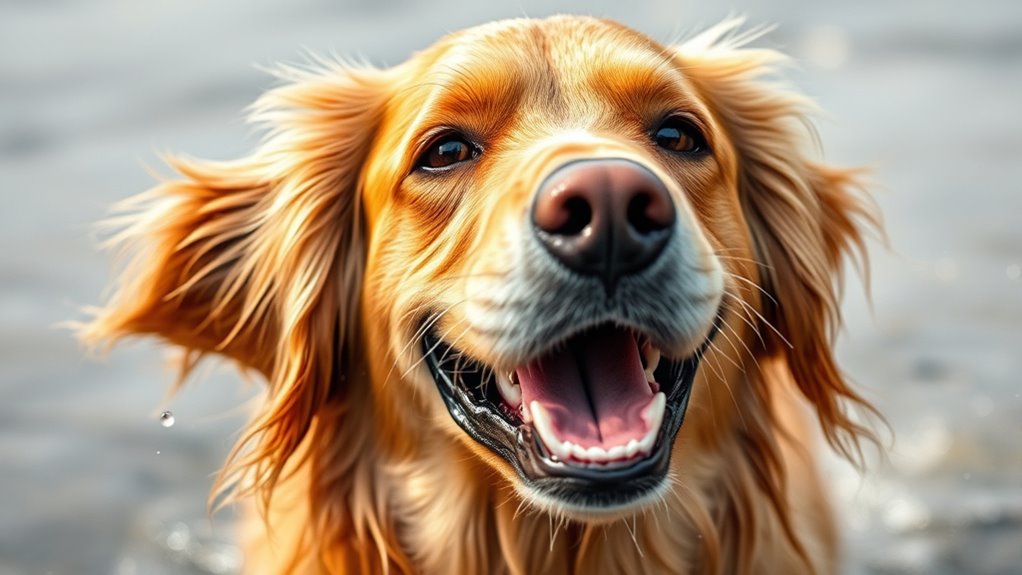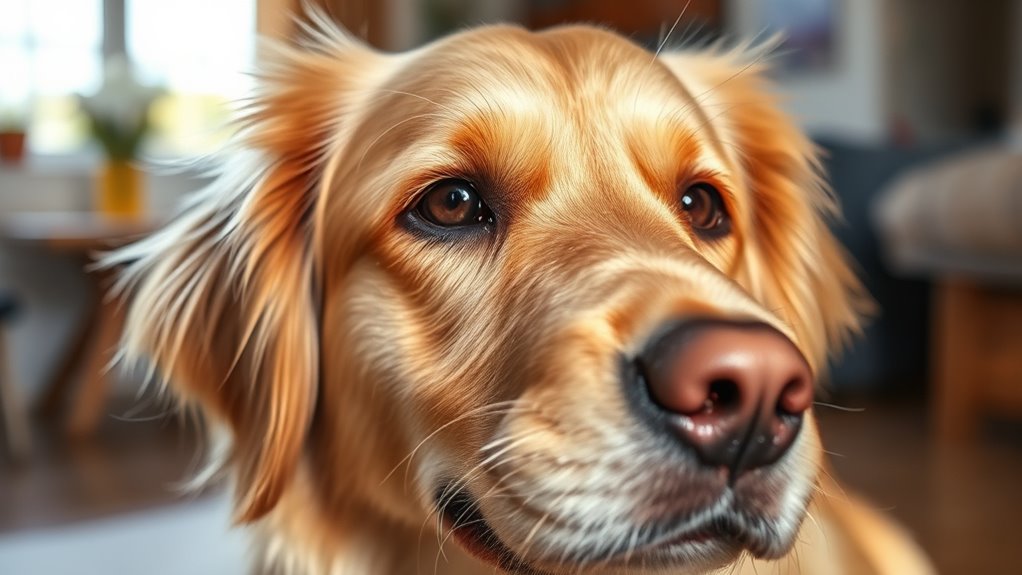Wet dog smell happens because bacteria and fungi thrive in damp fur, creating that musty odor. Dirt, oils, and moisture trapped in your dog’s coat make it worse, especially if grooming isn’t regular. Proper drying and frequent brushing help reduce the smell by preventing bacterial growth. Using odor-neutralizing products and maintaining good hygiene can also make a big difference. If you want to discover more tips to keep your dog fresh, keep exploring!
Key Takeaways
- Wet dog smell results from bacteria and fungi thriving in moist fur, often worsened by dirt and oils.
- Regular grooming with proper drying prevents bacterial growth and reduces persistent odors.
- Using odor-neutralizing products specifically designed for dogs helps eliminate, not mask, smells.
- Proper drying techniques and brushing distribute natural oils and prevent moisture buildup.
- Good nutrition and health checks support skin and coat health, minimizing strong or unusual odors.

Anyone who’s ever gotten a dog wet knows that unmistakable, lingering odor can be tough to ignore. That wet dog smell isn’t just a minor inconvenience; it’s often a sign of deeper reasons behind the odor and how we can tackle it. I’ve found that proper dog grooming plays an essential role in managing and reducing that smell. When I bathe my dog regularly, I notice a considerable difference in how fresh they smell afterward. Using quality dog shampoos designed for their coat type helps eliminate dirt, oils, and bacteria that contribute to the odor. It’s important not to overdo it, though—too frequent bathing can strip natural oils, leading to dry skin and more odor over time. Finding the right balance is key.
Proper grooming and balanced bathing keep your dog smelling fresh and healthy.
Beyond baths, I rely on odor neutralizers to keep my dog smelling fresh for longer periods. These products are specially formulated to neutralize rather than just mask smells, which makes a big difference. I prefer options that are safe for dogs and free of harsh chemicals. Applying odor neutralizers after grooming or during routine checks helps combat that damp, musty scent that often lingers after walks or playtime. Some sprays work by targeting bacteria and fungi that thrive in moist environments, which are common culprits behind the wet dog smell. I’ve also noticed that keeping my dog’s bedding clean and dry contributes considerably to reducing odors.
Proper drying techniques are just as important as grooming and neutralizing products. After a bath, I make sure to dry my dog thoroughly—using a towel and, if necessary, a blow dryer on a gentle setting. Moisture trapped in their fur creates an ideal environment for bacteria, which intensifies the smell. Regular brushing also helps distribute natural oils evenly across the coat and prevents matting, where moisture can hide and bacterial growth can flourish. Additionally, choosing specialized planters for indoor gardening can help improve air quality and reduce indoor humidity that may contribute to lingering odors.
Finally, a healthy diet influences overall odor. I pay attention to my dog’s nutrition, choosing high-quality food that supports skin and coat health. Sometimes, a persistent smell might be linked to underlying health issues, so I consult my veterinarian if the odor seems unusual or doesn’t improve despite good grooming and odor control. Managing wet dog smell involves a combination of consistent grooming, the right products, thorough drying, and proper hygiene. When I follow these steps, I find that my dog remains fresher, happier, and more comfortable—making those damp moments less overwhelming for both of us.
Frequently Asked Questions
Can Certain Breeds Be More Prone to Wet Dog Smell?
Yes, some breeds are more prone to wet dog smell due to breed-specific traits. Odor-prone breeds like Basset Hounds, Beagles, and certain terriers tend to retain more scent when wet. I’ve found that these breeds often have oilier coats or skin folds that trap moisture and bacteria, making the smell linger longer. Regular grooming and thorough drying can help manage this, but understanding your breed’s traits is key.
Does Diet Influence the Intensity of Wet Dog Odor?
In the blink of an eye, I’ve seen how diet impact can really influence a dog’s odor. What they eat affects their skin and coat, which in turn impacts odor control. Feeding high-quality, balanced food with proper nutrients can reduce wet dog smell, while poor diets might make the smell more intense. So, yes, diet plays a role—and choosing the right food helps keep your pup fresher longer.
How Quickly Does a Dog’s Smell Dissipate After Drying?
After drying my dog, I notice the odor typically dissipates within 30 minutes to an hour. The duration of the smell really depends on the drying time—thorough drying helps reduce odor faster. If I dry my dog well and use odor-neutralizing sprays, the wet dog smell disappears more quickly. Patience and proper drying can markedly shorten the odor duration, making my pup smell fresh sooner.
Are There Natural Remedies to Prevent Wet Dog Smell?
Absolutely, there are natural remedies to prevent that overwhelming wet dog smell! I swear by simple home remedies like diluted apple cider vinegar or baking soda baths—they work like magic! You can also try natural odor neutralizers like essential oils (lavender or eucalyptus) to keep your pup smelling fresh. It’s easier than you think—just a few natural tricks can turn your house into a fragrant paradise, even after those muddy adventures!
Can Grooming Frequency Affect the Severity of Wet Dog Odor?
Yes, my grooming schedule definitely affects how strong my dog’s wet dog smell is. I find that bathing routines done regularly help keep odor at bay, especially after walks or playtime. If I wait too long between baths, the smell tends to intensify. Keeping a consistent grooming schedule, including brushing and occasional baths, really makes a difference in reducing that damp, doggy smell and keeps my pup smelling fresh.
Conclusion
So, I get it—wet dog smell can be pretty stubborn. But trust me, with regular baths, thorough drying, and good grooming, you can keep that odor at bay. Some might think it’s just part of having a dog, but I believe proactive care makes a big difference. Of course, it takes effort, but your furry friend’s happiness and your home’s freshness are totally worth it. Give these tips a try, and you’ll notice the difference!









